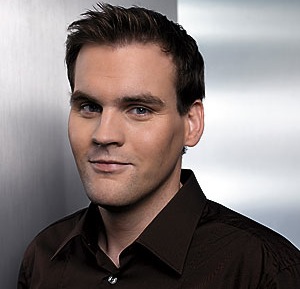 Last year was my first one at the WebhostingDay. I have made and interview with Kirsten Nothbaum of WHD team titled “WebhostingDay Brings Together The Brightest In The Industry” and went to the show after that. Some pictures from WebhostingDay have been published here after the conference. One year later I’m planing to go to WHD 2010 which takes place in the same Phantasialand near Cologne again. The 2010 event is focused on cloud computing and I have an increased expectations to learn some new things about the emerging cloud hosting industry, that I don’t know… I think it wouldn’t be hard ;)
Last year was my first one at the WebhostingDay. I have made and interview with Kirsten Nothbaum of WHD team titled “WebhostingDay Brings Together The Brightest In The Industry” and went to the show after that. Some pictures from WebhostingDay have been published here after the conference. One year later I’m planing to go to WHD 2010 which takes place in the same Phantasialand near Cologne again. The 2010 event is focused on cloud computing and I have an increased expectations to learn some new things about the emerging cloud hosting industry, that I don’t know… I think it wouldn’t be hard ;)
The last year’s WHD was well organized and anyone who I met there said very kind word about the team behind the show. It is worth to attend. A month and a half before the show B10WH.com speaks to Thomas Strohe, the man behind the event. Take 10 minutes of your time to read our interview with him.
Hi Thomas, let me ask you first what is the difference between last year’s WebhostingDay and WHD 2010? Will you welcome more participants this year, is there a growing commercial interest, or any new sessions?
Of course, we hope that at least as many attendees as last year will sing up. And regarding current numbers, it looks more than promising (registration is still possible until March 4th). With regard to official WebhostingDay partners – these are the companies having talks or/and exhibiting at the fair – and media partners we could already achieve an increase as compared to 2009. Now there are almost 80 partners altogether, while there were about 60 of them last year. Therefore, we will have a completely redesigned fair area, more keynotes and more rooms for the so-called hosting.SESSIONs.
Has the cloud computing trend changed the agenda of this year’s WebhostingDay, if you compare it to 2009 even? Last year “cloud computing” was more a “magic phrase” than and something tangible. When you are looking at this year’s WHD, at the sponsors and participants, can you say that we have made a step ahead in process of moving to the clouds?
Yes, even last year the cloud was a very popular topic, which will be the case again this year. A great number of talks and sessions carry the word cloud in their title or it is at least mentioned in the abstract. Many of the presented solutions are designed for cloud computing or cloud hosting. Moreover, CloudCamp, a bar camp with experts from the cloud sector will be held again in the framework of WebhostingDay.
Please tell the readers of B10WH.com more about the WHD sessions. Which ones do you find most interesting, and which one was harder to organize? Who of the industry’s “marterminds” was harder to bring to speak at WHD?
In fact nobody had to be convinced to speak at WebhostingDay. The event is highly appreciated, and we even had to call off some potential speakers due to a lack of free speaking slots. But this was necessary, you know, as the schedule would have blown otherwise. However, panel discussions have now been added to the agenda, which allow for multiple speakers at a time to discuss current topics. These are probably very interesting for the audience, since different points of view are presented.
A part from IT giants like Microsoft and Intel last year Parallels looked like the one of the most important partners of WHD? Who is staring this year?
We are glad that we were able to enthuse those big players like Microsoft, Parallels, Intel, AMD, HP and Fujitsu for WebhostingDay again. But also the smaller businesses are very valuable partners for us, which either want to establish themselves or their products on the German market, or come from Europe and want to gain new customers from America or Asia by this means. The combination of “old hands” and newbies is what makes the event more diverting and interesting for visitors.
Do you have any partners who joined WHD for the first time this year?
Yes, there are several partners who have joined for the first time, e.g. GateSecure, who will be presenting a web filter, Genotec, an ISP from Switzerland, and STULZ, who work on data center cooling solutions, to name but a few.
On the website you say that WebHostingDay 2010 is “the most important web hosting event in the world”? Is the WHD really the biggest and most important event in web hosting industry? Do you compete for the top spot with HostingCon… or the WHD is focused mostly on the European web hosting markets?
Looking at the numbers of visitors and exhibitors, WebhostingDay really is the world’s largest web hosting event. And even if the majority comes from Europe today, we can detect a clear development to more and more international audience. By the way, we do not see HostingCon as a rival, but both events as having a friendly coexistence.
As an organizer of a major industry event you receive a lot of insight information which helps you to better understand the market’s developments. Let me ask you is the North American web hosting industry more innovative than the European markets… if we look at the cloud computing we will see that most cloud hosting providers we can find on the market are American?
I don’t think that North-American web hosting companies are more innovative than European companies. But the continent as a whole gets more attention due to giants like Google or Amazon. The potential of the cloud has been recognized in Europe, of course, and many companies begun developing very specialized solutions for B2B purposes. As many innovations are not targeting the end user, they are not talked about so much in the public. When visiting WebhostingDay you will be able to meet many of those companies and solutions.
How do use see the German hosting market from a cloud computing perspective? Are the German businesses more skeptical or enthusiastic when it comes to cloud computing and cloud hosting infrastructures?
Basically, German companies are open-minded for this topic, but it will probably take some time until a majority of companies has changed their infrastructure respectively. Especially in times of uncertain economic situations, people will likely wait and see until new things are tried and tested before investing into them.
I hope you can answer a question from a provider’s perspective. What do you think would happen with the “good old server” within the next year? Do you see many people who used to use physical dedicated servers to migrate to virtual machines?
As far as the respective offers are attractive regarding price and performance I see potential indeed. We have been offering virtually dedicated servers ourselves with one of our brands for many years now, which have gained more and more approval over the years. If the performance of these systems can meet the highest professional demands in future, it is likely that many people will choose this alternative in order to save some cost.
There has been a lot of talk about the financial crisis. It has become the most used “word” and probably the most used explanation of anyone’s business failure within the last 2 years… Is the current financial situation in Europe and Germany hitting the web hosting sector?
Luckily, the hosting industry has suffered quite little from the crisis so far. That is because server-based applications are used in every modern company for daily work, so that they cannot really cut down on them. Of course it happened here and there that some clients broke away because they became insolvent, but generally speaking it did not hurt the industry so badly.
Now I have a question about the WHD 2010. I’m curious why don’t you change the place or the time when WHD takes place? It is always in Phantasialand, which is OK, but if you decide to host the event between May and September there shall be much more fun for the attendees?
We are very satisfied with Phantasialand as conference venue, because it offers, for instance, a central location in Germany that can be reached easily from everywhere. Additionally, it has the equipment we need and we have made good experiences in working together with their team. Regarding the time, it is quite close to CeBIT, which attracts many visitors from abroad. That way they get the chance to combine both events in one journey. And if we made it in summer, the theme park would normally be open to the public and it would be impossible to close it for the event without causing unnecessary cost.
Did you get yourself in any funny situations during the last year’s WHD or through the years. Something related to the organization, any mistakes taht you would share today?
There are always some minor mishaps, of course, which cannot be avoided even by the best organization. This begins with the weather – in 2008 our signposts in the park were blown down by the strong wind – and continues in technics, e.g. when one of our presentation notebooks falls down in the lecture room and has to be replaced quickly. But apart from that we have been spared from greater disasters so far. No speaker that became ill shortly before the event or complete power outage etc. Let’s hope it remains that way!
I’m sure that every entrepreneur has a story to tell about who did they get down to their business. Please tell me yours!
I founded my first company when I was only 15 years old and sort of operated it from my room. I had the idea to start the company when I detected a market gap in Germany in the area of dedicated hosting. It was an advantageous time for the IT sector and the company was able to grow quickly. Together with the brothers Jochen and Christoph Berger I founded Intergenia a few years later.
What did make you to organize WebhostingDay. You would have a successful business without being involved in this venue. Does it help you to stay connected to others in web hosting industry and do you learn anything from being part of it?
That’s right, even without being organizers of a hosting event we would have been equally successful as a company. But we actually had in mind then that by exchanging views between industry colleagues many valuable synergies could develop from which all involved parties could profit. Even if it would only mean to get to know each other better, which makes business easier in the follow-up. There had just been no such forum in Europe before. I wanted to close this gap.
Thank you very much for taking some of your time to talk for B10WH. See you in Cologne.
 ResearchAndMarkets.com announced the release of additional research papers to its “Data Center Market in Europe 2016-2020” report. It reflects on Software Defined Data Centers (SDDC), which is considered as the latest trend in the data center services market.
ResearchAndMarkets.com announced the release of additional research papers to its “Data Center Market in Europe 2016-2020” report. It reflects on Software Defined Data Centers (SDDC), which is considered as the latest trend in the data center services market.